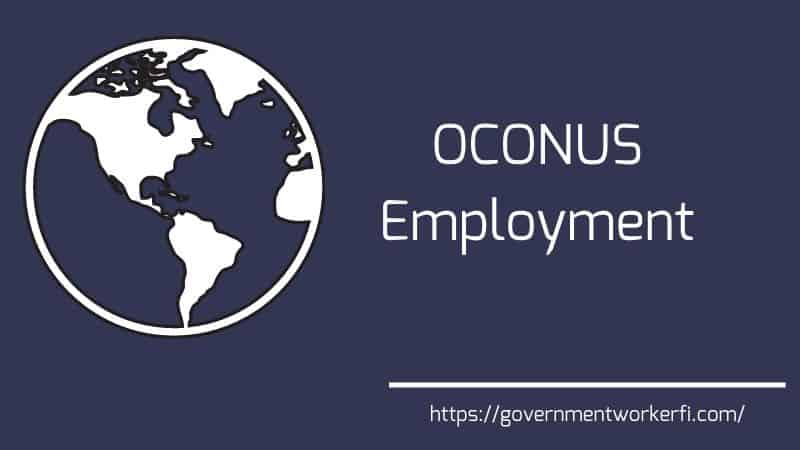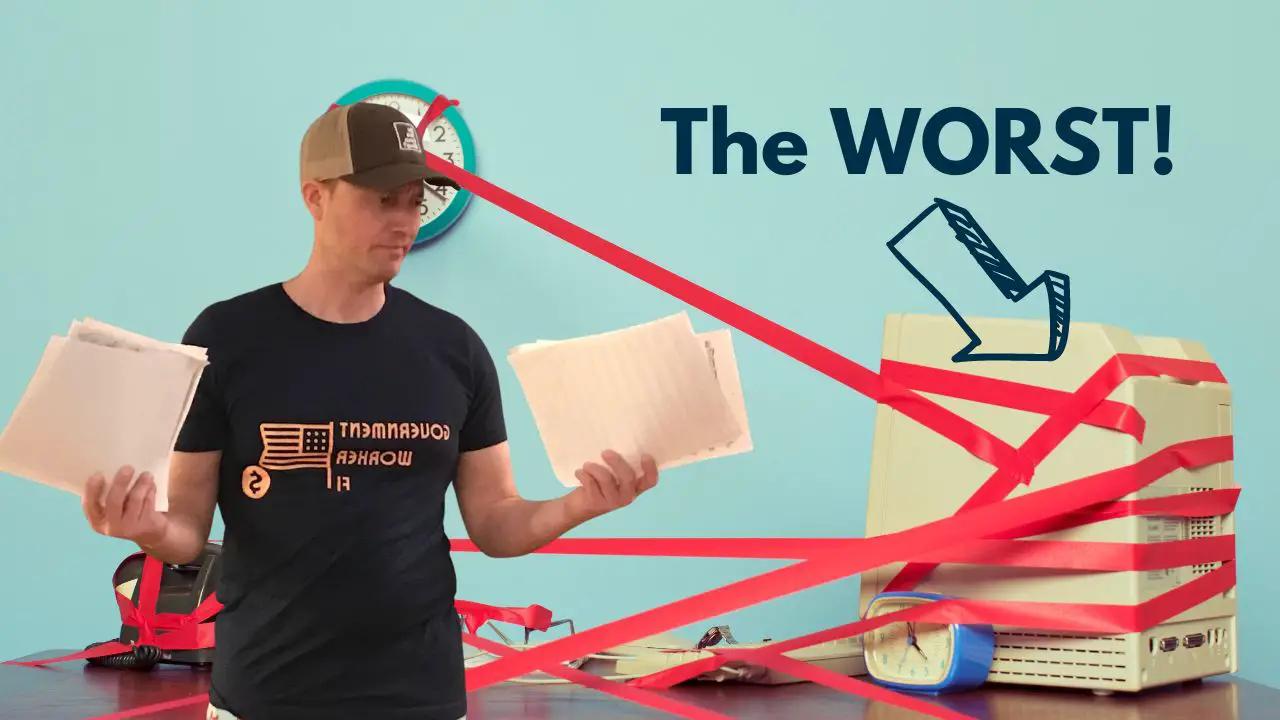Over the past few months I’ve focused on writing posts that help federal employees understand their benefits. In doing keyword research, I noticed that there were a lot of Google searches for “federal employee lunch break rules” and almost no good answers. I debated whether I should write a post on this topic or not. At first, I didn’t think anyone would want to read about something as mundane as lunch breaks. But then, I thought, if people are searching for this information and can’t find anything readable, then maybe I should write something. So if you’re a subscriber and know everything there is to know about your lunch break, please feel free to join me again next week. If you’re not a subscriber, smash that subscribe button *so hard* to get awesome posts about federal employment in your inbox each week.
Get Gov Worker’s top 4 tips for federal employees!Table of Contents
- Who makes the rules about federal employee lunch breaks anyway???
- Why would someone be concerned about federal employee lunch breaks???
- Other lunch break questions
- Summary- Everything you wanted to know about federal employee lunch break rules
Please do not confuse my personal blog for financial advice, tax advice or an official position of the U.S. Government. This post may contain affiliate links. If you make a purchase after clicking on a link, I get a small percentage of the sale at no additional cost to you.
Who makes the rules about federal employee lunch breaks anyway???
Oh man is this complicated. Once I decided I wanted to write a post about federal employee lunch break rules, I actually, you know, needed to figure out what the rules were. As always, I started with the OPM rules regarding lunch (meal breaks). Unfortunately, this webpage is barely readable. It keeps calling out references to 5 U.S.C. 6101(a)(3)(F) and 5 CFR 550.112(m). What’s the differences between USC and CFR? USC vs. CFR sounds like a college football matchup.
USC vs. CFR
I learned the difference between USC and CFR as part of writing this post. You can also read a beautiful thread on Reddit about the difference. Furthermore, my Twitter friends, especially Dillon of Dollar Revolution helped me out too. USC stands for United States Code and it is the actual laws passed by Congress. Since Congress passes new laws all of the time, they put the USC together as an easily searchable document for understanding the laws.
While Congress makes the laws, the executive branch enforces the laws. The CFR stands for “Code of Federal Regulations”. The CFR documents how the executive branch interprets and enacts the laws within the USC. Similar to the USC, the government compiles the CFR as an easily searchable document.
Got all that? USC and CFR should generally be in alignment with each other but they come from different parts of the government. Most rules about federal employees can be found under Title 5 of the USC. The lunch break rules that OPM cites come from both section 6106 of Title 5 and part 550 of Title 5 of the CFR.
Fair Labor Standards Act vs. USC Title 5
If this weren’t complicated enough- the USC and CFR have two different applicable sections about lunch breaks. Title 5 of the USC deals with federal employee rules. However, the “Fair Labor Standards Act” (technically 29 USC Chapter 8) sets rules for many employers/employees throughout the United States (including the federal government).
So OPM allows each agency to set their own policy about lunch breaks. However, each agency must follow both laws regarding federal employees (USC Title 5 & Title 5 of the CFR) as well as the Fair Labor Standards Act (FLSA). In general, the laws mandate more protections under Title 5. For instance, the FLSA does not require your employer to give you a lunch break at all.
Again, it’s good to be familiar with the legal framework regarding your lunch break. However, what you should really care about is your official agency policy or master agreement (if your place of employment is unionized).
Agency policy vs. master agreements
So I assume you found this article on federal employee lunch break rules because you are a federal employee. (I broke down some scenarios of why exactly you wanted this information below.) Unfortunately, I can’t answer your question for you because there are lots of different federal employee lunch break rules! It all depends what agency you work for and if your specific office/base/site is unionized.
Master agreements
If you work at a unionized office, the union will have established a “master agreement” with management. This master agreement sets the rules for all employees (whether or not they belong to the union). If you’re a federal employee concerned about lunch break rules and covered by a union, it’s a good time to familiarize yourself with your master agreement. The document will tell you everything you ever wanted to know about pay, leave, and breaks.
Depending on your union, your master agreement may cover a lot of employees or only a few. The National Federation of Federal Employees (NFFE) has established nationwide master agreements for the Forest Service and the department of Veterans Affairs. These master agreements cover many employees (the Forest Service Agreement covers nearly 20,000 employees). Other master agreements only apply to a single office. (For example, this master agreement only applies to Bureau of Land Management employees at two different locations in California.)
Because there are so many different master agreements throughout the federal government, I cannot possibly list them all. My advice to you is to find your specific master agreement and read it.
Agency policy
In the absence of a master agreement, your workplace or agency should have an employee handbook. Unfortunately, most of these only exist on the agency intranet pages. Therefore I wasn’t able to find much information on what was out there. Furthermore, there could be hundreds if not thousands of different policies throughout the federal government.
Since the Department of Defense has the most employees, I did some searching and was able to retrieve this Army civilian employee handbook. which does cover rules about lunch breaks. However, unless you’re an Army civilian employee, you will need to do some searching on your own.
There are no uniform federal employee lunch break rules across the federal goverment
If it isn’t clear by now, there isn’t a single source for all of the federal employee lunch break rules. In fact, even within a specific agency, employees in different offices can have different rules. Let’s look through the three examples I was able to find: VA master agreement, FS master agreement, and the Army civilian handbook.
The Army handbook basically repeats the OPM guidance. The handbook states that the Army cannot make you take a lunch break longer than 1 hour. Other than that, the handbook gives a lot of leeway to supervisors.
The VA master agreement talks about two classes of employees. Some employees have a fixed 30 minute lunch period. The workplace must offer employees a chance to eat during their paid shift if they can’t take an unpaid break. Finally, the FS master agreement requires employees to take a half-hour unpaid lunch break any day in which they work more than 6 hours.
So you can see that there are many different rules across the three different agencies I could easily find information for. Your best bet is to find your own agency’s policy. Unfortunately, Google won’t be able to help you and you’ll need to poke around on your agency’s intranet page.
Why would someone be concerned about federal employee lunch breaks???
When I was writing this post, I tried to think about why someone might Google “federal employee lunch break rules”. I figured that if someone was trying to find this information, they must be having a disagreement with someone about lunch breaks. Who fights about lunch breaks? I figured there were three types of people looking for this information
- Employees who feuding with their supervisor
- Supervisors having issues with employees taking weird lunch breaks
- Gossipy coworkers who want to know why their colleague gets to have a special lunch
As I said before, there are very few general lunch break rules that pertain to all federal employees. However, I have tried to come up with actionable advice (i.e. what I’d do) in all three of these situations.
Employees feuding with a supervisor
Did your supervisor tell you something that seemed unfair? Perhaps he or she made you work through your unpaid lunch period to finish a project by the deadline. Or maybe they made a rule that you needed to eat lunch at your desk so that you could answer an email as soon as it came in. If this sounds familiar to you- keep reading!
If you’re a bargaining unit employee (BUE), the easiest thing to do is talk with your union. Even if you don’t pay dues, they represents all BUEs. Also, if anyone knows your specific office’s policies on lunch break rules for federal employees, they do. The union will help you determine whether the supervisor’s rules were allowable under the master agreement and come up with a strategy to help you. If your supervisor tried to force you into an improper lunch break situation, they could help you file a grievance. Even if the lunch break rules were technically permitted, if they were causing you stress, they might be able to help you talk with your supervisor to come up with an alternative solution.
If you don’t have a union, then it’s up to you to educate yourself. The first step is to find your employee handbook (probably on your intranet somewhere) and read it carefully. If you find that your supervisor’s request goes against your agency policy, point it out to him or her and have a discussion about it. Hopefully your supervisor would not willingly want to break agency policy. However, you might need to escalate the situation. You could try contacting Human Resources for advice. Or perhaps speaking to your supervisor’s supervisor.
Supervisors having issues with employees
Let’s look at the same situation but from the other side. Do you have an employee who wants to take a 3 hour lunchbreak each day so they can go home and walk their dog? (As a dog lover, I think that’s a fantastic idea, as a supervisor, I’d need to think about it.) Or maybe you have an employee who wants to just work through their 8-hour shift with no breaks to get home sooner. Should you allow it?
Speaking supervisor-to-supervisor, I would hope by this point you’ve memorized your Master Agreement or employee handbook. (If not, you might find professional liability insurance to be a good investment).
I’m continually dumbfounded by fellow supervisors who are dealing with grievances all of the time because they tried to implement policies expressly forbidden by the MA. But I digress.
Since you know your workplace policies, you can make a decision whether or not the request is even allowed by the rules. If it’s not, you can have a heart to heart with your employee. Explain that you are sympathetic to their request but that you need to deny it because it is not allowed by the agency.
What if your employee requests something that is technically allowed but unusual? I would lean towards allowing it. The world will continue to spin on its access if you are actually kind toward your employees. But if you feel like you absolutely don’t want to approve the request, it is in your power to do so as long as you stick to your agency policy. You may also wish to talk to employee relations (the legal branch of HR) to make sure they agree with your assessment. And if it were me, I’d talk to the union as well. There’s nothing wrong with talking with the union. If you shared your concerns in advance maybe you’d be able to find a compromise that works best for everyone.
Gossipy coworkers
Let’s say you work down the hall from Steve. Every day Steve leaves at 10AM and comes back at 10:30 AM. You’re pretty sure you can only take lunch between 11 and 1 and this does not seem fair that it appears Steve takes a lunch at 10 AM.
My advice would be to leave Steve alone. Chances are that Steve and his supervisor have worked out agreement that works for them. Maybe they even got someone with the agency to sign off on it. Are you upset because you also want to take lunch at 10? Instead of trying to get Steve in trouble, maybe you should talk with your supervisor about moving your lunch break.
And before raising holy-hell about it at work, make sure you’ve read your employee handbook/master agreement. It wouldn’t be a good look to be a whistle-blower about an illegal lunch break that was actually legal.
Other lunch break questions
Keysearch told me that here are some related questions to my post topic. If you came here looking for a related question, hopefully I’ve answered it below.
Are federal employees allowed to drink alcohol on their lunch break?
Probably not. See my post about federal employee drug testing. You can learn more about federal employee drug and alcohol rules by reading Executive Order 12564, Drug-Free Workplace policy.
Do employees have to take lunch breaks?
It depends. On the broadest level, Fair Labor Standard Act does not require employers to provide lunch breaks. However, your state may have its own regulations. Within the federal government, you can see big differences between the MAs for the Forest Service, VA, and the Army employee handbook that I linked to above.. Some agencies allow employees to work through lunch and others require that they take a half-hour unpaid lunch.
Can your boss make you do work on your lunch?
No. CFR-785.19 is emphatic about this. If you take an unpaid lunch break, your employer cannot require you to work. For example, your employer cannot force you to eat at your desk during a meal break.
Do salaried employees get a lunch break?
“Salaried employee” is typically slang for an “exempt employee” under the Fair Labor Standards act. Within the federal government, the employee rules are not typically different for meal periods between exempt and non-exempt (hourly) employees. The best bet is to check your employee handbook. Outside of the federal government, your state law may require your employer to give you a meal period.. If you’re not a federal employee and found this article- keep looking for more information.
Do lunch breaks have to be paid?
No. “Lunch break” refers to a bona fide meal period in CFR-785.19. These breaks are unpaid. Shorter, “rest periods” as defined in CFR-758.18 must be paid. However, these breaks serve a different period than meal periods in 785.19. Employers are not required to give paid rest periods. See the Fair Labor Standards Act for general information. And read your employee handbook or Master Agreement for advice that pertains to your specific role.
Summary- Everything you wanted to know about federal employee lunch break rules
Proofreading this post, I realized I wrote 2,500 words about lunch breaks. And on top of all that, I probably didn’t answer your question. (But I hope I at least told you where to look to find more information about the federal employee lunch break rules that pertain to you).







